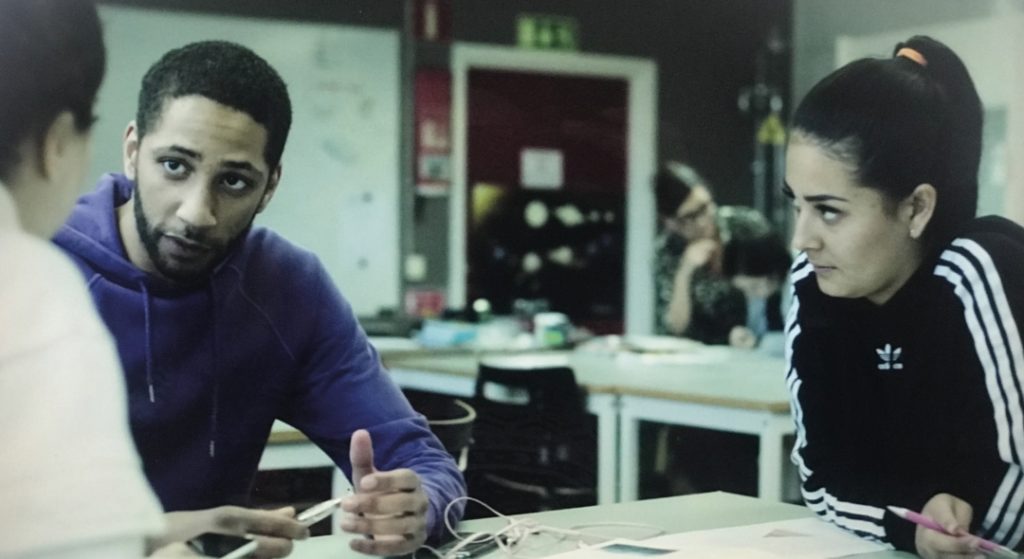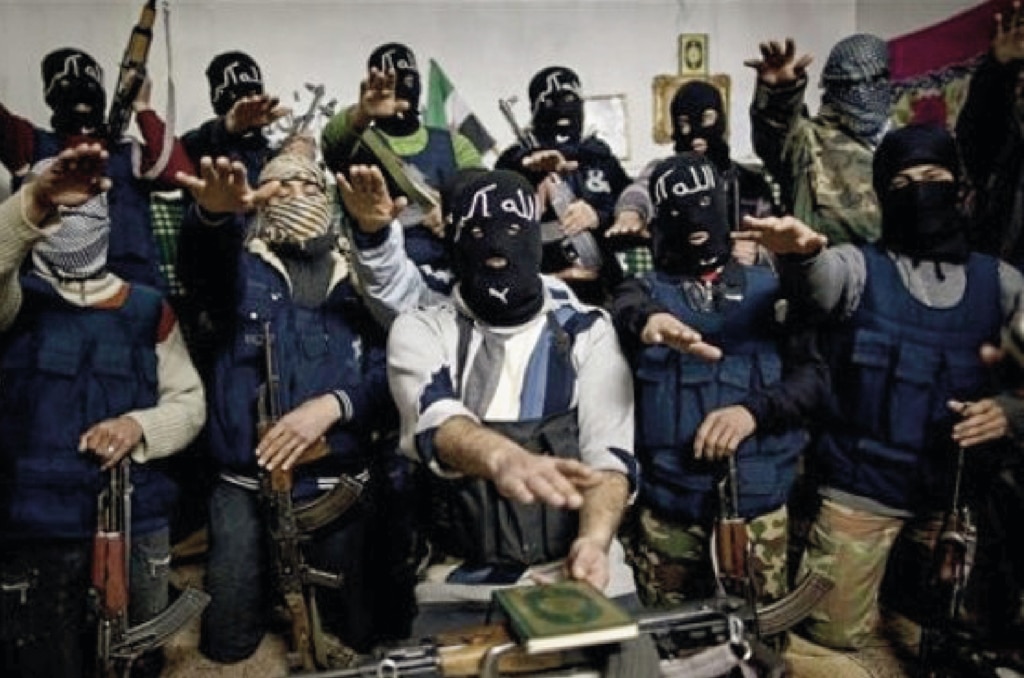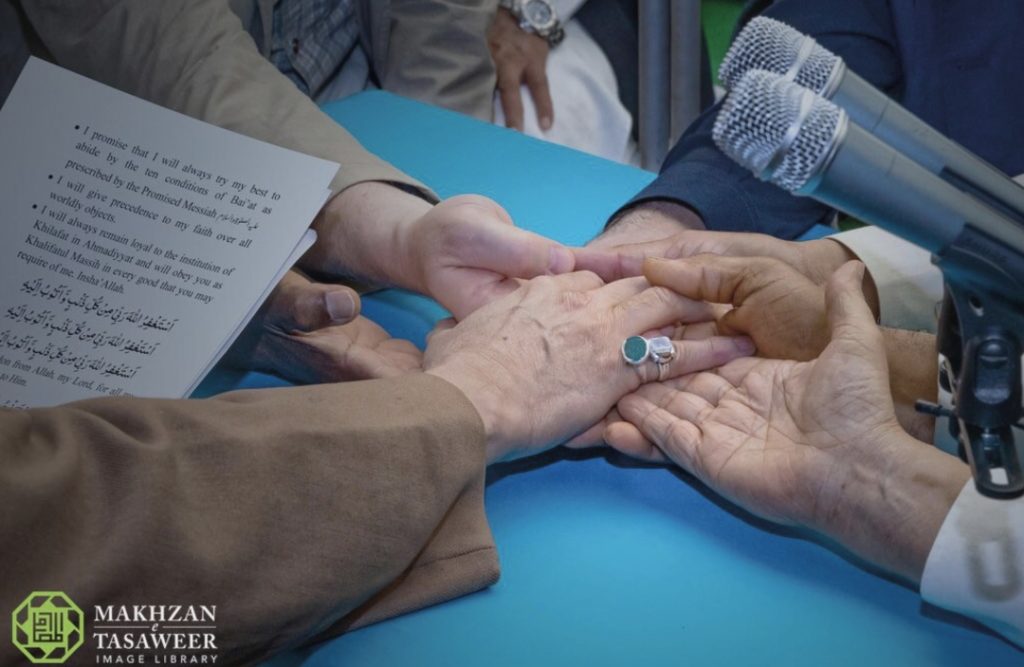Jalees Ahmad, Al Hakam
As she walks through the streets of Raqqa, Parvin, the wife of an ISIS fighter, Husam, tries to give solace to her friend, whose husband is in a coma and fears for her life that she’ll be married off. Just as Parvin tells her friend that everything will be alright, a commotion overtakes the city, with people screaming, running and others hurrying to find a safe place.
A “traitor”, as held by ISIS fighters, is captured and blind-folded, whilst forced to bring out his hand. Knowing exactly what is about to occur, Parvin desperately tries to look away and continuously tells herself, “Don’t look, Parvin. You can’t look”. Breathing heavily, with her eyes wide open, Parvin finally looks away.
The blade drops! Ominous music plays in the background. This is just another day in Raqqa.
The Swedish drama series Caliphate, nowadays streaming on the popular on-demand service Netflix, tells the almost-too-accurate story of how young minds fall prey to a fallacy of a notion; how they are enticed and brainwashed into serving the self-proclaimed “caliphate” in Syria, fashioned into carrying out horrific acts of terrorism, all the while being told and promised of “jannah”.
Discussing where he found the idea and inspiration of writing this series, writer Wilhelm Berhman said in an interview that he initially got the idea when the news continuously reported on ISIS. He went on to say that when he saw the news of the three young girls who fled the UK to join ISIS – Shamima Begum, Amira Abase and Kadiza Sultana – he was taken aback.
“I was so upset about it”, Wilhelm says, “maybe because I have a daughter the exact same age, so I realised I had to write something about it”.

After watching the series, as an Ahmadi Muslim who has accepted the Promised Messiahas as prophesied by the Holy Prophetsa of Islam, I feel grateful for the true Khilafat bestowed to us from God’s sheer mercy; the Khilafat that guides us along every path; that guides us to become our best selves; that helps us understand the true wisdom of the Holy Quran; helps us understand Islam and helps us serve humanity in the best possible way.
We have a system in place that teaches the youth the true essence of Islam and organises various activities, which creates a sense of belonging – something that was obviously missing among the many disenfranchised youth who opted to join the Raqqa based organisation in the series.
Ironically, it is a sense of belonging that is crucial in preventing young minds from being radicalised. Amidst the many, many issues it has endeavoured to tackle in its eight-part series, one issue, unfortunately, remained unanswered: the projection of the true Islamic teachings.
Whilst watching the show, as Muslims who pray for the Aal-e-Muhammad (followers of Muhammadsa) daily and throughout the day, who earnestly and sincerely hold their faith and the faith of their Mastersa in high esteem, it becomes immediately clear that to any viewer unacquainted with Islam’s true teachings, it will still raise questions as to why people still follow this religion at all.
When a daughter mentions to her once-Muslim-mother that apostates must be killed as it is stated in the Quran, she simply replies by saying, “The book is over a thousand years old.”
Although it may not be suitable to enter into an entire debate about this issue here, it has to be proclaimed clearly that the writers surely did a poor job in explaining what could have otherwise been answered in only a couple of additions to the script.
Apostasy is NOT punishable by death; it is not punishable at all in Islam. This, I feel, should have been addressed within the series as it would have highlighted the ridiculous notion that ISIS stands for.
The Holy Quran is very clear on this matter. In fact, the Holy Quran even goes as far to say, “For you is your religion and for me, my religion” and again, “There is no compulsion in religion”. How wonderful it would have been if these verses somehow slipped into the script of this series and made it clear that the ISIS caliphate is completely oblivious to the very teachings they so proudly profess.
Needless to say, there were some serious issues with the series. However, not all is negative.
The series, set in 2015, handles a very sensitive subject. After hearing of a plan to attack Sweden, the young Swedish woman, Parvin, along with her baby, stuck in Raqqa, feels desperate to flee from the everyday chaos that surrounds her.
The ambitious Fatima, an agent of the Swedish Security Service, receives a phone call from Parvin, who tells her about a plan of an attack in Sweden. Fatima promises Parvin that she will help her escape Raqqa.
However, in return, Parvin is tasked with investigating and providing more information on the attack. The plot also tells the story of two young girls – Sulle and her friend Kerima – who find themselves being radicalised by a man named Ibrahim, who is working as a teacher’s assistant in a Muslim high school.
Ibrahim, also known by his ISIS brothers as “Al-Musafir” or “The Traveller” attempts to entice the young girls into fleeing Sweden for Raqqa to serve the “Caliphate” by falsely promising them a luxurious lifestyle. After being lured in and brainwashed, arrangements are made for their departure.

As they leave, Sulle’s younger sister, Lisha, joins them and they make their way to airport. Eventually, when Sulle’s father finds out, he makes his way to the airport with an officer. They head for Syria and finally intercept the transport vehicle at the border between Turkey and Syria and manage to rescue everyone except for Lisha. Fatima, after revealing vague details about a terror plot to her superiors, is forced to stop the investigation and ultimately suspended.
However, she continues to collect information of the terror attack, she learns the three planned terror targets which are to take place simultaneously. Eventually, all three attacks are stopped by the security service, who, as we find out later, knew about the attacks all along and decided to keep Fatima in the dark due to deeming her untrustworthy.
The reason given by the head of the security service for waiting till the last moment to act and not acting sooner is shocking. The security service told the media that being able to stop the attack was a result of long-term surveillance and systematic reconnaissance. They also wished to give off the impression to the public that Sweden was very vulnerable in terms of international terrorism. This would, in turn, lead them to further strengthen the belief that only the Swedish security service could protect them.
This certainly makes the viewer question whether such state of affairs – which seems all too plausible in today’s unpredictable world – is even viable in the world and whether we have been subject to this. Conspiracy theorists, be alerted. In the last episode, Fatima, upholding her promise, arranges to travel to Syria to save Parvin, Lisha and Husam, and tells them to be ready.
Seconds before she arrives, Husam’s colleague shows up to summon him for a suicide mission. Lisha, who is unwilling to return to Sweden, completely radicalised and brainwashed, exposes their plan to escape. The very last scene sums up the crux of the series. Kerima, once again radicalised by Ibrahim, decides to plan another attack at a girls’ concert. Kerima, lured in after being led to believe that Sulle planned the attack with Ibrahim, straps a bomb to her chest where she plans on committing suicide.
She texts her friend, Sulle, “Time to die!!! See you in heaven”. Confused, Sulle calls Kerima. Realising that she’s been tricked, Sulle pleads Kerima to take the vest off. Kerima desperately tries but to no avail.
Knowing that these are her final moments, Kerima asks Sulle if she can stay with her and comfort her over the phone. In these last moments, we are shown the true innocent nature of these simple young girls who have been lured into something they haven’t the faintest clue about.
As they realise that they have been tricked, they started to grasp the reality of the situation. Ibrahim, having tapped her phone, is listening to the conversation in his car with a remote control, ready to trigger the bomb. Sulle realises now that not only has she lost Lisha but has also just lost her best friend.
These young girls, as portrayed in the series, are misled with information given in the media. Their ideologies, based on what they see on TV, further digs the tunnel into darkness and hatred until they become prey for people like Al-Musafir. Another aspect that I felt is a take-home lesson is the mismanaged way the parents of the young girls treated them.
Even though the father has been seen watching the news constantly, these stories continued to eat at Sulle’s subconscious. When she displayed warning signs, he never helped guide his daughters and let them roam freely, knowing the dangers of the media.
This further goes to show that parents should be there for their children, something that our Khilafat has constantly stressed. Would any sane parent desire for their children to play around broken glass or with fire? The same applies with reality and real life. Every day, we are constantly bombarded with horrific news stories that are unhealthy for children to openly see without any proper guidance on the matter.
The sad reality is that we live in a world today where the media is in control of what we see and how we see them. The days are over when human nature had the ability to think and extrapolate information for themselves.
Now we are simply told how we should feel and how we should view things through the power of the media. The media has simply etched into everyone’s mind that Islam is a religion of war and terror and that all Muslims can only unite to serve a bloodthirsty notion of leadership, who, in reality, entices people and uses them as an outlet for their own selfish desires.
The entire series shows how the ISIS caliphate brainwashed and tricked young minds, something that true leadership would never do. By using the sentiments of caliphate, which has always been a good thing within, not only has ISIS committed a fraud in the name of Islam and everything sacred it carries, but the media has, unfortunately, portrayed Khilafat (or Caliphate) as a brainwashing mechanism.
Yes, the ISIS caliphate was and is a brainwashing mechanism. What the series got absolutely right is how they showed these youth, who desired a sense of belonging, being brainwashed due to their longing for unity under Khilafat. It just goes to show how Islam has been used in politics and how ISIS used politics to draw out the sentiments of young Muslims who are promised a sort of unity and direction.
However, if you look at the Rightly Guided Khilafat (Khilafat-e-Rashida) after Prophet Muhammadsa and Khilafat-e-Ahmadiyya in this day and age, you will see that it was not established to brainwash people and give false hope.

Studying history, we find that Khilafat should be the direction in life and a purpose to live for, without resorting to violence when things aren’t going your way. In the Holy Quran, we are told about the four roles of a prophet:
1. To teach arguments in support of Islam’s truth
2. To convey God’s word to people and to teach them the dos and don’ts
3. To explain the commands of the Holy Quran and their innate wisdom and thus, uplifting the faith of people
4. To endeavour for the physical and spiritual purification of people (Surah al-Baqarah, Ch.2: V.130) (Commentary taken from Tafsir-e-Kabir by Hazrat Mirza Bashiruddin Mahmud Ahmadra, Vol. 2, p. 195)
These very objectives are the goal of a khalifa, for a khalifa’s purpose is no different from the prophet he succeeds. These goals are being achieved by Khilafat-e-Ahmadiyya in over 200 countries of the world.
Ahmadi Muslims adhere to the true teachings of Islam as prescribed by their Khalifa on a regular basis. This is the type of Khilafat that the Ahmadiyya Muslim Jamaat has and continues to believe in wholeheartedly.
It is this Khilafat that we celebrate every year on 27 May. Through this Khilafat, we are guided at every step of the way.


Thumbs Up! Hope the writer of the drama reads your article and fixes his scripts.